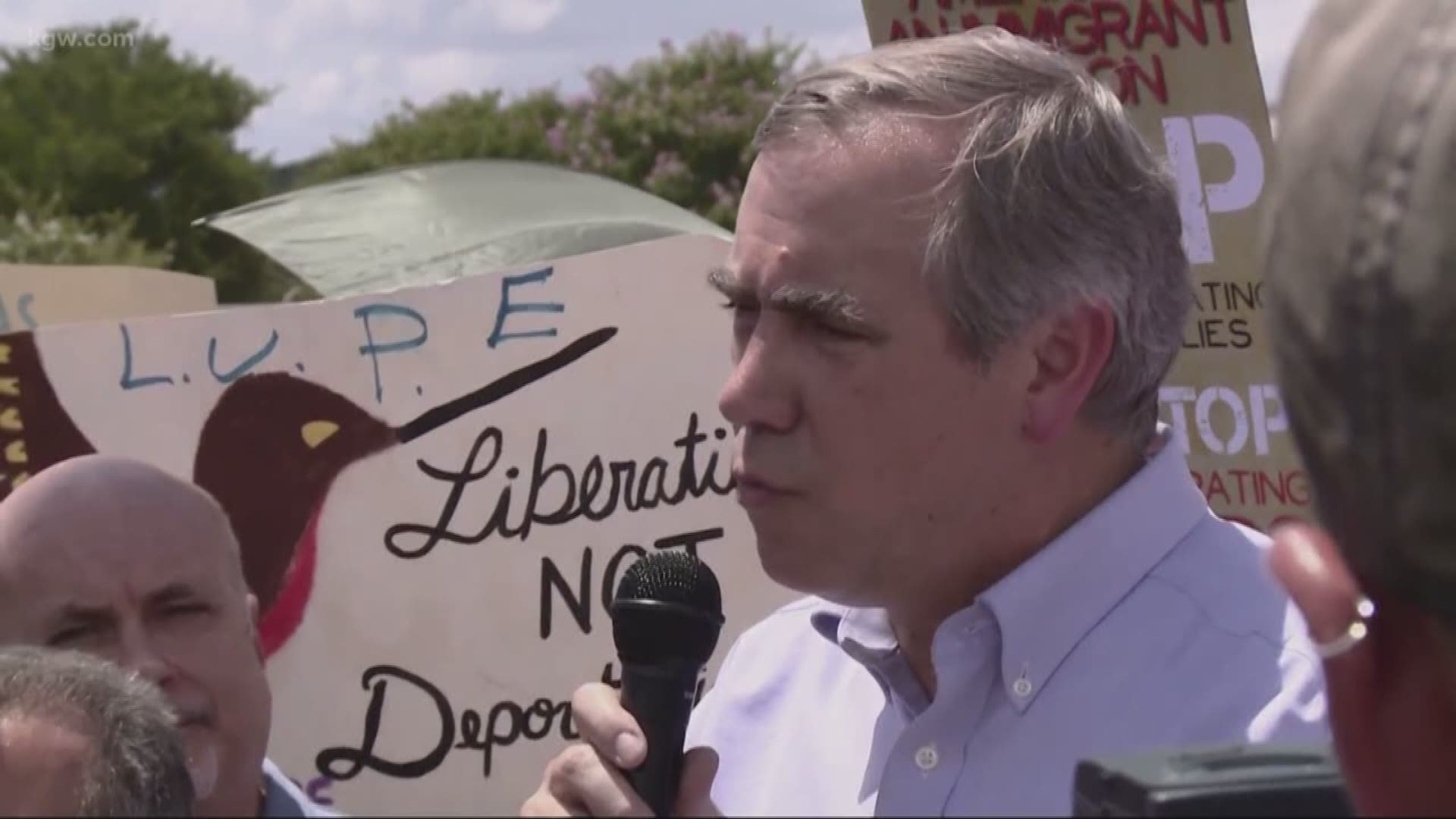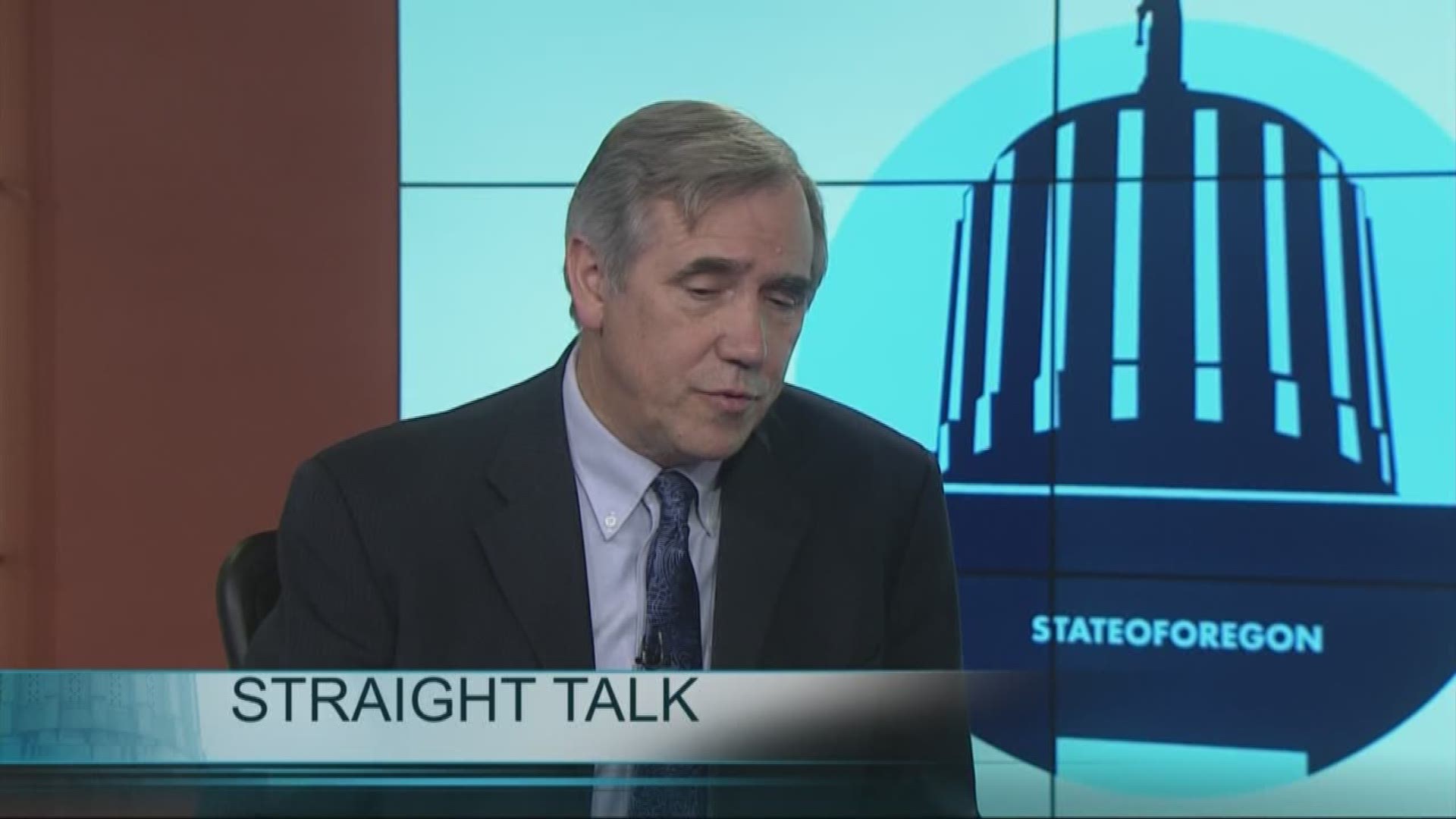PORTLAND, Ore. — He's a Democrat, a liberal senator who wants to make Medicare available for all Americans, has pushed bills to stem climate change and is a sharp critic of President Donald Trump. And he's seriously considering a run for the White House.
It's not Vermont's Bernie Sanders. It's Jeff Merkley, a senator from Oregon whose national profile rose this year when he led opposition to the Trump administration's immigration policy that saw parents forcibly separated from their children.
Merkley, in trying to gauge voter interest in a run for the presidency, has already visited Iowa, New Hampshire, South Carolina and Nevada, states that have early primaries and caucuses in the presidential sweepstakes.
He didn't have much name recognition nationally until last June, when he tried to enter a federal facility in Texas where immigrant children were being held. An aide videotaped the scene as he was refused entry and police were called. The video quickly went viral with over 1 million views in a day, and was repeated in newscasts across the country.
In October, Merkley introduced legislation to prevent the Trump administration from forcing asylum seekers into internment camps.
"It's just a simple question of human decency and justice," Merkley said in an interview with The Associated Press. "We're a nation of immigrants. The vast bulk of us have, somewhere in our ancestry, people who fled religious persecution, or famine, or war."
Merkley said immigrants fleeing persecution were being treated as criminals and are being traumatized. He described the forced separation of children from their parents as "an obscenely dark and evil act."
The administration says the crackdown is necessary to stop illegal immigration.
In his trips to other states Merkley has spoken with people "in their living rooms, their porches their backyards, nearby parks."
"You get together with a bunch of people and you talk about the state of the world," he explained. He discussed with them issues he has led on, including ending predatory home mortgages; battling "climate chaos" — as he calls climate change; fighting for equality for the LGBT community; and opposing trade agreements that ship Americans' jobs overseas.
"The feedback's been very positive," Merkley said, though a beat later he added that maybe the people were just being polite.
His father was a millwright maintaining machines in a plywood mill and in the forest then did other jobs. Merkley lives in a one-story house in the same blue-collar neighborhood of Portland where he grew up, giving him a humble Jimmy Carter quality.
Carter lives in the same house in Plains, Georgia, he built in 1961. He too was a little-known Democrat on the national stage before being elected president in 1976.
Merkley, 62, attributed his success to "serendipity."
"If I lived a thousand lifetimes I would probably never have been in the U.S. Senate," he said.
As a kid, Merkley excelled in math and science. He applied for college at almost the last minute, being unfamiliar with the process, and was accepted at Stanford and Yale. He chose Stanford for the financial aid.
He was shocked to learn that all the other students in his dorm had visited the campus before. It had never occurred to his family to do so, and they lacked the money anyway.
"It was a stressful couple of years (but) I wanted to prove that the blue-collar kid could keep up with the kids from prep schools, so I had to work a little harder," he said.
His first exposure to national politics began when he interned in Washington, D.C., for Sen. Mark Hatfield, a moderate Republican. He was elected to the Oregon Legislature and then won Hatfield's former Senate seat, in 2008, narrowly defeating the Republican incumbent. He handily won re-election six years later.
Merkley is busy these days boosting, with appearances and donations, 18 Democratic candidates in key states via his Blue Wave political action committee. He's also hiring field staff in states like Iowa and New Hampshire to back some of those candidates, workers who could assist in laying the groundwork for his presidential run.
(Story continues below)
If he decides to run, Merkley must find a niche in a potentially crowded field, said Travis Ridout, a professor of government and public policy at Washington State University. The key is finding appeal from at least one segment of the party, whether liberal progressives, racial and ethnic minorities, labor unions or others, Ridout said.
"Trying to distinguish yourself with so many potential candidates is a difficult task," Ridout said. However, Democrats seem to be looking for someone new who they feel can win, a potential plus for Merkley, Ridout said.
Merkley has been compared to Sanders, who lost the Democratic nomination in 2016 to Hillary Clinton. Politico Magazine said Merkley, the only senator to endorse Sanders in 2016, "could inherit Bernie Sanders' progressive mantle in 2020."
Sanders' supporters complained that the party machinery was skewed against his candidacy, but Merkley believes the machinery isn't going to be that important in 2018.
"I think it's going to be people in these states who get excited about one candidate or another," Merkley said. "And you know, some kind of magic happens along the way, but you don't really know how that's going to unfold."
Merkley said he'll decide whether to run after next week's midterm election.
Follow Andrew Selsky on Twitter @andrewselsky



